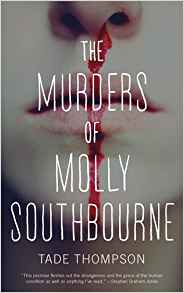Liz Bourke Reviews The Murders of Molly Southbourne by Tade Thompson
 The Murders of Molly Southbourne, Tade Thompson (Tor.com Publishing 978-0765397133, $11.99, 120pp, tp). October 2017. Cover by Rekha Garton/Arcangel.
The Murders of Molly Southbourne, Tade Thompson (Tor.com Publishing 978-0765397133, $11.99, 120pp, tp). October 2017. Cover by Rekha Garton/Arcangel.
Tade Thompson’s first two novels, Making Wolf and Rosewater, were both very well received – the first winning the Kitschies Golden Tentacle Award, and the second shortlisted for the John W. Campbell Award. The Murders of Molly Southbourne, part of Tor.com Publishing’s novella line, has already been optioned for the screen. I can see why: it’s a novella about blood and doppelgängers, one that feels intensely visual. It would translate well to the screen, and might even work better as a film than it does as a novella.
The Murders of Molly Southbourne is told mostly from Molly’s point of view in the third person, but it’s framed at beginning and end by two sections told in the first person from the point of view of an unnamed character chained up in a basement that we learn belongs to Molly – we learn that Molly’s the one who chained her up. What we don’t know is why, or what this serial-killer-esque opening will lead to. It leads to Molly telling her prisoner a story….
Molly’s blood makes murderous doppelgängers when it is shed outside her body. She and her parents call them mollies. The reason that Molly’s blood has this effect is opaque to Molly, though as the story begins in Molly’s early childhood, it’s clear that this peculiar blood-borne disease is normal to Molly, even though she may be the only one in the world to suffer from it. Her upbringing involves her being home-schooled on her parents’ farm. Her father is a farmer, her mother apparently a former special operations/spy type. They kill the mollies, and train Molly to kill mollies and dispose of their bodies, to bleach and burn any of her blood that falls. (This is complicated at puberty by the onset of menstruation.)
Molly spends her childhood experimenting with the mollies and killing them. By the time she’s an adult, she’s seen herself die more times than she can count. When she goes to college, she finds that her disease makes everything harder. Eventually, she learns, too, that having sex with men causes mollies to grow slowly inside their bodies, like cancerous growths, ultimately resulting in their deaths. When her parents are killed (also by mollies, ones that were trapped in Molly’s childhood and overlooked), Molly’s coping methods for her own life, never that great, break down entirely. In the conclusion, we learn that Molly is trying to find a lucid non-murderous mollie to replace her, because she’s tired of living.
The Murders of Molly Southbourne is an enormously vivid, enormously peculiar novella. It’s a story about trauma, about not having any choice about being a danger to yourself, and about trying to find some way to control something that is both intensely personal and horrifically inexplicable. It struck me while I was reading that The Murders of Molly Southbourne is essentially a parable about mental illness. The danger to you looks exactly like you. It comes from within you. It can destroy your relationships. You struggle to exert control over it. I’m not sure I agree with its thematic arguments, but it’s making them in interesting ways. And it’s vividly, compellingly written: well worth a look.
Liz Bourke is a cranky queer person who reads books. She holds a Ph.D in Classics from Trinity College, Dublin. Her first book, Sleeping With Monsters, a collection of reviews and criticism, is out now from Aqueduct Press. Find her at her blog, her Patreon, or Twitter. She supports the work of the Irish Refugee Council and the Abortion Rights Campaign.
This review and more like it in the December 2017 issue of Locus.







